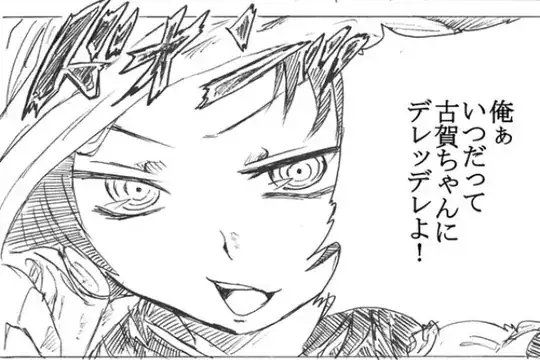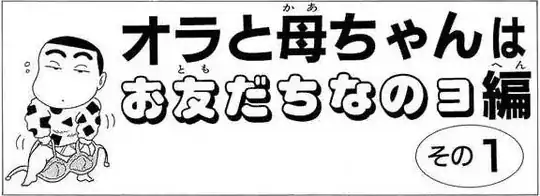I heard in animes the term おら. I am assuming by context it is actually 俺. Why is it pronounced this way? Is the kanji for おら a different kanji and not 俺? Is おら a childish way to saying 俺?
-
1Related (duplicate?): https://japanese.stackexchange.com/q/12806/7810 – broccoli facemask Apr 15 '20 at 11:19
-
It is just written sometimes in kanji and sometimes in kana. Does this answer the question? – dgg32 Apr 15 '20 at 14:17
-
^ ?? Are you aware that the reading of 俺 is お**れ** and not お**ら** ? @dgg – Chocolate Apr 15 '20 at 14:34
-
In jisho.org, the おら entry states: also written 俺 and 俺ら. The site has shown 己 for おら search however. – dgg32 Apr 15 '20 at 14:38
2 Answers
Version 1: おれは (ore wa) pronounced quickly or with exaggerated stress on お may sound like “oraa” (sometimes denoted in writing as 俺ぁ or similar).
 Source: うにゃ@Pixiv
Source: うにゃ@Pixiv
Could this be your situation?
Version 2: Hinted by comments, I could find some Crayon Shin-Chan (クレヨンしんちゃん) manga samples and indeed he seems to be using オラ as a personal pronoun.
I guess we can’t say for sure which one you have without listening to the audio or seeing closed captions (subtitles) for the show.
Version 3: there also exists an old pronoun おいら (can be both singular or plural), and a female オラ in some dialects.
- 6,553
- 2
- 17
- 38
-
1So does that mean is I am to use 俺ぁ、the sentence 俺ぁは魚が好き would be wrong because that would mean 俺はは魚が好き(Notice the double は). The correct sentence would then be 俺ぁ魚が好き? – Newbie Apr 15 '20 at 13:47
-
-
5「おら=おれは」ってこと? でもクレヨンしんちゃんは「おらのとーちゃん」とか、ドラゴンボールの悟空も「おらに元気を分けてくれ」とか言うし – Chocolate Apr 15 '20 at 16:40
-
@Chocolate 「俺は」がなまった「俺ぁ」が「おら」と聞こえた、という話かと。「俺」とは異なる一人称としての「おら」があるのでややこしいですが… – Spoonail Apr 16 '20 at 04:24
-
1@Spoonail If I interpret correctly, 俺ぁ and おら are 2 different things? 俺ぁwould mean 俺は , but おら on the other hand, is just a first person pronoun? – Newbie Apr 16 '20 at 10:35
-
-
Thanks all, added a bit of clarification and a sample panel of what I’m talking about – Igor Skochinsky Apr 16 '20 at 11:11
I heard in animes the term おら. I am assuming by context it is actually 俺.
Yes it is equivalent to おれ.
Why is it pronounced this way?
Dialect difference.
Is the kanji for おら a different kanji and not 俺?
I don't know if おら even has a kanji version since it is a dialect difference.
Is おら a childish way to saying 俺?
No, it is a dialect difference. There is also at least おいら and probably lots more variations. Also, although the textbook will tell you that おれ is strictly for men, women may also use it depending on the dialect.
-
If it is a dialectal difference, it would be worth mentioning at least one example of where it is used. – a20 May 16 '20 at 22:04
